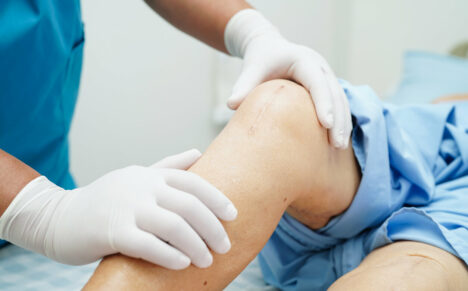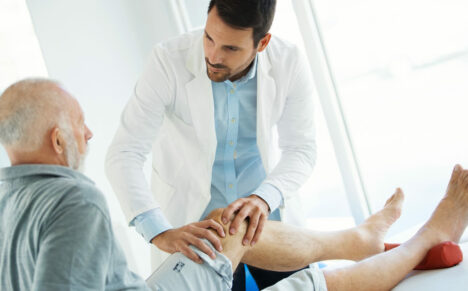Hip replacement is one of the most successful orthopedic surgeries performed today, and it has the potential of not only allowing you to experience much greater quality of life, but to also improve your overall health. Since osteoarthritis (or degenerative arthritis) is more prevalent as you get older, and it is one of the most common reasons that hip replacement surgery is recommended, it follows that many adults undergo this type of surgery as they age. If your orthopedic surgeon has recommended a total hip replacement for you, talking with your surgeon is the best place to get information to meet your specific needs. However, there are some general things about hip replacement surgery that you can expect. And, there are a few extra things you should be aware of to get the best results possible from your hip surgery if you are over the age of 65.
What Anyone Having Hip Replacement Surgery Should Expect
Hip replacement surgery most likely will have a very positive effect on your life, but there are specific things you should be aware of, beginning with how to prepare before surgery and ending with what your rehabilitation will entail after surgery, to make sure that your recovery goes as smooth as possible. Before surgery you should try to get yourself in the best physical shape possible, which includes eating a well-balanced diet, getting plenty of rest and performing any exercise approved by your orthopedic surgeon. If you smoke, it’s best to stop for a number of health reasons, including your recovery. Everyone is different but on average, your hospital time will be just an overnight stay. Physical therapy will begin in the hospital and continue at home and with outpatient physical therapy as you recover. Immediately after surgery you will have pain medication if needed, but most patients require very little pain medication after they leave the hospital. In addition, you should expect to take a blood thinner for a little while to prevent blood clots, often something as simple as aspirin. The important thing to remember is to take your medications as prescribed and discuss any concerns with your surgeon. You can expect to follow up with your orthopedic surgeon regularly to monitor your progress, and then annually to evaluate the health of your new hip.
What You Should Know About Hip Replacement if You Are 65 or Older
Many of the people that have hip replacement surgery are older adults, so if you are in this age group, you are not alone. Although 60 may be the new 40, as we get older, it is important to take special care to address the needs that arise. If you look around at your group of friends that are your age, you will see you all have things in common. Your eyesight or hearing may not be as good as it once was. You might find that if you stand up too quickly, you could experience a moment of dizziness. It may be that you have other chronic illnesses that you take medications for, or after years of dealing with arthritis, you may get up a little slower than you used to, or don’t feel as steady on your feet as you did when you were younger. Not to worry, because these are all things that can be accommodated for as long as you do the proper planning. And even if you feel as spry as you did at 20, it’s better to do the extra planning that you may not need, than to be unprepared. So, let’s take a look at a few considerations.
Be Your Healthiest Self
If you’re already an active senior, you’re off to a great start, but if pain or other illnesses have prevented you from getting regular exercise, talk to your orthopedic surgeon. Some surgeons recommend preoperative rehabilitation to improve your strength and stamina before surgery. Additionally, eating a healthy diet filled with low fat, high fiber foods that are rich in vitamins and nutrients will prepare your body for the healing process. And again, if you smoke—quit. Smoking can interfere with healing and increase your risk of lung complications or infection after surgery.
Prepare Your Postoperative Environment
There are some recommendations that are universal for all age groups. Stairs may be more difficult initially, so some patients prefer to arrange all of their living activities on one level. This may mean moving your living quarters downstairs temporarily or moving things like small refrigerators upstairs so that you limit your trips up and down. Although physical therapy will show you how to climb stairs prior to leaving the hospital, running up and down the stairs multiple times per day should likely be avoided. Recliners will be on your “things to avoid” list so it is important to have a chair with a firm, straight back available for your recovery. Make sure that you have a stocked home, including medication refills because you won’t be going out much initially. If you live alone, you will need to have a friend or family member stay with you initially, and after that you should identify and talk to people who can be there to support you by checking on you and/or running errands. Finally, as you get older, falls can cause serious injury, especially after you’ve had hip replacement surgery. To be clear, a fall is a fall regardless of the cause. This means that whether you stand up too quickly and get dizzy or you step on something on the floor that causes you to lose your balance, the result can be devastating, which is why we’ll spend extra time discussing falls prevention.
Prevent Falls
Falls are a leading cause of injury, resulting in debility, as we get older. Since prevention is the best medicine, here are some tips to prepare your home before hip surgery that you can continue to utilize well after recovery. Make sure your lighting is good. Never get up from bed during the night without turning on a light and night lights in every room that you might enter is a good idea. Initially going to the bathroom at night may be challenging so you could consider a bedside commode. And speaking of bathrooms, grab bars in the shower, a shower chair, a raised toilet seat and handlebars near the commode are all things that can make you safer. Also, evaluate your floors and walkways. They should be clear of anything that may cause you to trip—throw rugs, electrical cords, clutter, grandkid or even animal toys. If you have small animals, you might consider having them visit family or friends for a little while, or maybe let them stay in their own area in the house while you’re up and walking. As far as walking goes, initially you will be using an assistive device like a walker. Make sure to use it as you were instructed, and make sure to ALWAYS use it until your surgeon or therapist has told you that you are safe without it. If you need to carry something, make sure your walker has a basket or tray so that you can use two hands on the walker. And don’t walk backwards, because you can’t see what is behind you that might trip you. As you get up from lying or sitting, go slow, take deep breaths, then stand to make sure you don’t feel dizzy before you walk. Finally, don’t be afraid. Fear of falling can actually make you less safe. Your surgeon and your physical therapist will guide your recovery and they wouldn’t tell you to do anything that you can’t.
Medications, Medications, Medications
If you are 65 or older, you might have medications that you take regularly for other health problems. After hip replacement surgery you will probably have a few more temporarily. This is why it is extremely important to bring your orthopedic surgeon an accurate and updated list of everything you take on a regular basis. This includes all of your prescriptions, any over-the-counter medications and all vitamins and supplements. There may be some medications or vitamins your surgeon will ask you to stop temporarily. There are also medications that can interact with other medications and even with your vitamins and supplements. So, before you go to your preoperative appointment, take the time to sit and physically go through every bottle and update your list. If this is difficult for you, then just gather everything in a bag and bring them to your appointment. It is also a good idea to use the same pharmacy for all of your prescriptions. The pharmacist may catch a combination of medications that might cause you problems, who can then contact your doctor to discuss any concerns.
You will also want to be aware of any potential side effects from the medications you will be sent home with after surgery. Your surgeon may give you a temporary supply of narcotic pain medication. These pills are good for pain relief but can cause stomach upset, constipation and dizziness. It is best to take them with food. You should try to drink plenty of water and eat a high fiber diet, although your surgeon may also give you a stool softener to combat constipation. And as stated before, get up slowly. These medications can make you dizzy so go slow to prevent falls. The blood thinners that you may be taking temporarily are very important to prevent blood clots. However, you should be aware of possible side effects so that you can take precautions. Do not stop taking them unless you are told to by your surgeon. The obvious side effect can be bleeding and bruising, so shaving with a sharp razor is not advised, and all the above mentioned fall prevention strategies are very important. If you notice any blood in your stool, if you spit up any blood or if you have nose bleeds, you should contact your orthopedic surgeon right away. In fact, if you are experiencing any troubling side effects from your medications, you should call your surgeon.
Watch for Complications
Most people recover without incident from hip replacement surgery, but you should always watch for and work to prevent complications. Infection is a potential complication from any surgery, so if you start running a fever or notice drainage from your incision, you should call your surgeon. Be sure to follow your post-operative instructions for care of your incision to prevent infection. You will be taking blood thinners to prevent clots but if you notice increased swelling of your lower legs, you should call your surgeon. If you have chest pain or shortness of breath, you should be seen in the emergency room right away. Finally, it is really important for the health of your lungs that you get up and moving as soon as possible. If you go home with a hand-held spirometer, use it as often as instructed. If not, it is good to take 10 deep breaths and to try to cough every hour. Inactivity can lead to pneumonia after any surgery, and the risk goes up as you get older so it’s important that you actively participate in keeping your lungs healthy and strong.
Remember that a many people undergoing hip replacement surgery are older adults, and it is a very successful surgery that will get you moving again without pain. The benefits are not only an improved quality of life, but the more active you can be, the better your overall health will also be. Hip replacement surgery may be the best decision you can make for your health and being informed will give you the tools to enhance your recovery. Dr. Brett Gilbert and our friendly team are here to answer all of your questions. If you are interested in learning more about hip replacement surgery, or if you have any other concerns about hip or other joint pain, we’re just a phone call away. To seek the expert advice of Dr. Brett Gilbert in Raleigh, Durham, Cary and Apex, who will address your unique concerns, contact us today by calling us at (919) 788-8797 or you can request an appointment with Dr. Gilbert using our appointment request form, or you can self-schedule your appointment here.




